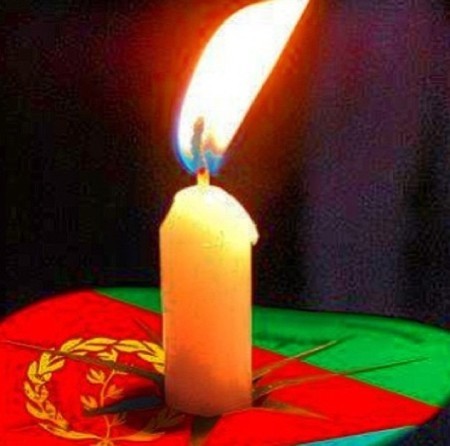A little over a year ago, the Italian island of Lampedusa was a place not known to most Eritreans. Today, the name of this idyllic, coastal community remains painfully etched in the minds of most of our citizens, both at home and in the diaspora. The death of 368 of our compatriots, who found a watery grave just a mile of the coast of the island, sparked a profound period of national mourning not seen since the days of the Badme War. Shocked and dismayed, many hoped the tragedy would wake us from our collective slumber and alert us to the crisis in our midst: the plight of thousands of Eritreans who make the harrowing journey out of Eritrea and onwards to Europe.
The list of privations Eritreans have endured in the course of their recent exodus is long and well documented. Before Lampedusa and the Mediterranean there was Israel and the Sinai; before the overloaded Italian-bound ships destined to capsize were the Bedouin torture chambers and grotesque trade in Eritrean organs. The places and agents of Eritrean suffering have changed, but our suffering is not new. Lampedusa was the ugly, sordid climax of a decade long national tragedy. It provided a startling window into the harsh realities of our present condition.
Politicizing Tragedy and the Tragedy of Politicization
Extraordinary times, the saying goes, call for extraordinary measures. Lampedusa should have been a call-to-arms. It should have sparked a collective effort, amongst Eritreans of all walks of life, to pressure relevant foreign governments and international agencies into protecting our refugees and their interests—in Sudan, Libya, and along the Mediterranean crossing.
To be fair there were many in the diaspora who understood the gravity of the situation and faithfully responded. These were people who tried to build bridges, and use tragedy to forge new solidarities that could help those in need. Yet they were the exceptions not the rule. Far too many of us chose to politicize the situation. Government critics laid Lampedusa at the feet of the Eritrean government, and argued that the blood of its victims – including a mother and her newborn child – now stained the hands of the PFDJ. Government supporters, in turn, boldly accused their critics of complicity in the trafficking of those who died along the trans Mediterranean passage. In an embarrassing turn of events, government and opposition supporters chose to hold separate vigils for Lampedusa’s victims, illuminating in one, simple act, the deep rifts that have divided a once cohesive community.
We have no desire to adjudicate between these differing perspectives, or censure our fellow Eritreans. We respect the diverse views of our compatriots— government and opposition supporters alike. Yet we must also be honest about our shared limitations. What worries us is our collective failure to put aside the partisan bickering of the moment, and address an event that put an exclamation mark on our national humiliation. A society that cannot come together and speak with one voice, when the lives of its citizens are devalued and debased by others, is a society that has lost its bearings. Would such national humiliations have been tolerated by the diaspora in an earlier era? Did we not move mountains, together and as one, when our country was occupied and traditions trampled upon?
Lampedusa, then, was not one tragedy but two. The first was the death of 368 Eritreans. The second was the failure of their compatriots to honor them by collectively speaking on their behalf.
Between Mourning and Action
The failure to bridge our political divide, to be magnanimous towards ones opponents in a time of national crisis, has had far reaching effects. Since Lampedusa, 32,000 Eritreans have been rescued in Mediterranean waters, the majority by Italy’s Mare Nostrum, a naval operation designed to avert another Lampedusa-like tragedy. Yet hundreds have perished on the high seas in an effort to reach Italy’s shores, and the death toll continues to rise. Many more continue to suffer abuse in squalid Libyan detention centers. There appears to be little prospect of a solution. Meanwhile, Eritreans in the diaspora who publicly mourned Lampedusa’s victims have largely forgotten the plight of their successors. While the Pope, the Italian parliament, UNHCR, and European publics, remain preoccupied with the problems of Eritrean migration, many Eritreans in the diaspora remain preoccupied with legitimation of their own political stands. As a result, instead of occupying center stage in the resolution of our own problems, we have taken front row seats. We are no longer agents of our own destiny, but witnesses to the continuation of our own suffering. It is a sad state of affairs.
What we require is a genuine initiative – independent and non-partisan – which mobilizes all Eritreans around the goal of protecting our citizens. We must pressure foreign governments and relevant international institutions to better police Mediterranean waters, better monitor Libyan detention facilities, and better deter the criminal gangs that continue to kidnap and ransom our citizens. A unity of purpose will be critical to this endeavor, for the wider world will not take our concerns seriously if we do not coordinate our activities and pool our resources. We are a nation with a rich tradition of social activism that, in the past, has pulled together to protect the most vulnerable among us. Its high time we act like it.
One year after the tragic events of Lampedusa, the unfortunate truth is this: until we demand, in a united voice, that other governments and other citizens treat Eritrean refugees with the dignity they deserve, our national humiliation will continue.


Well written and very insightful! I echo your thoughts completely.
Thank you for your comment Genet!